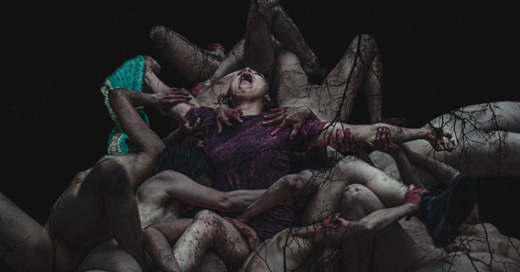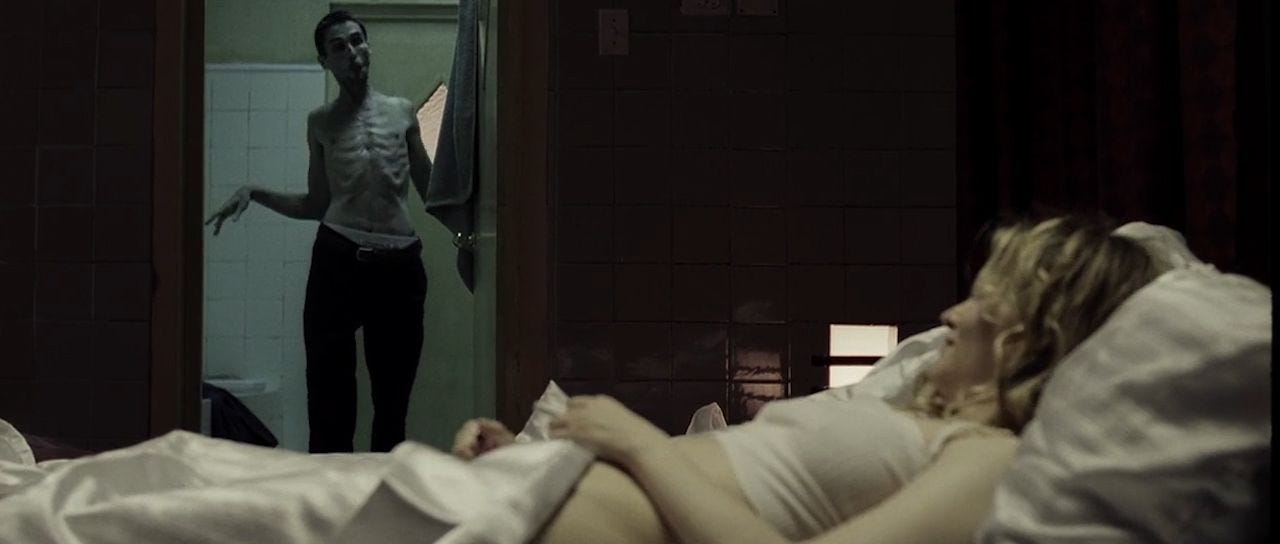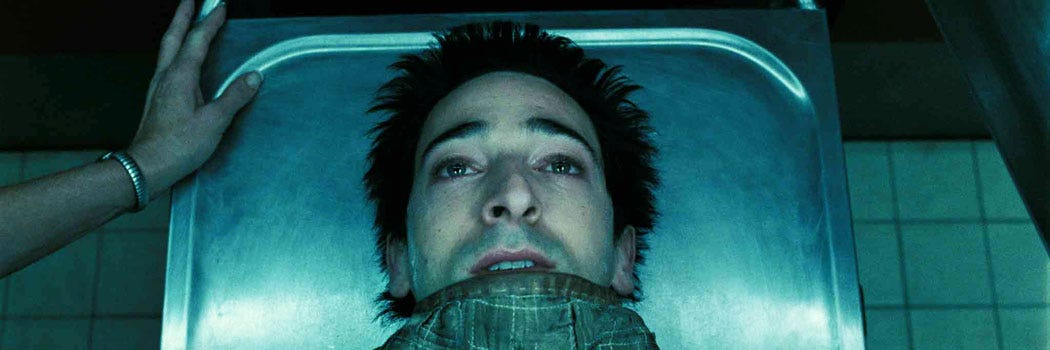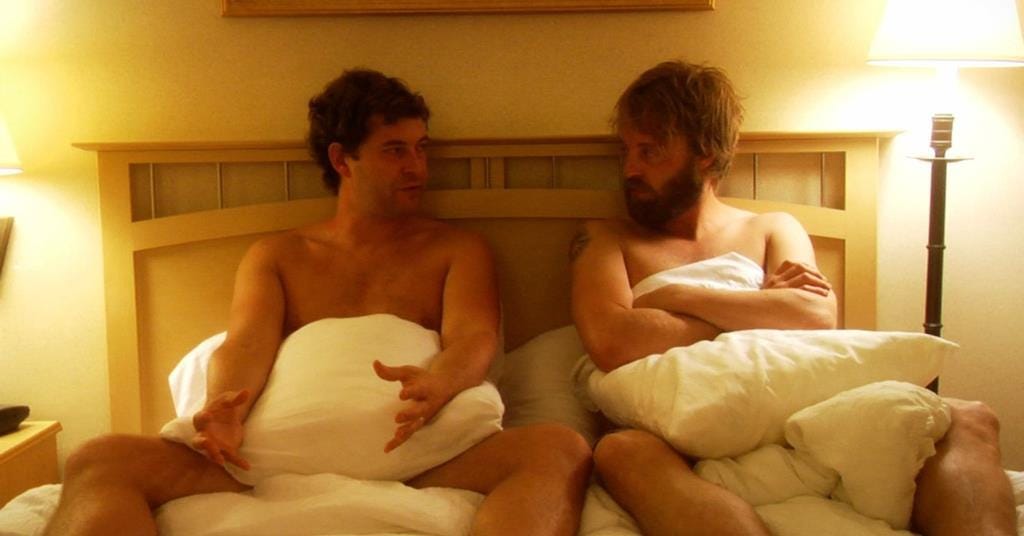Film Daze Cinema Club #6 (April, 2023)
This month's cinema club is all about dudes being dudes and movies that can be painful to watch.
MOVIES THAT HURT TO WATCH
For the past few weeks, I’ve had a pain residing within the muscles at the base of my neck. It snakes down the tendons that bracket my spine if I’m not careful as I turn my head. It’s forced me to be very careful and economical with my movements. I haven’t figured out a way to get rid of this pain yet, and so I’ve spent the past few days smelling of camphor, throbbing like an open wound, like a bruise. I’ve also spent the past few days watching movies that exacerbate my ache; it’s not intentional, but it does feel comfortable. Watching movies containing bodies that tremble and quiver with pain feels good in the way that pressing down on a strained muscle feels good.
Here are a few movies that it hurts me to watch, but that I’ve been enjoying because they pull me back into my body, into pains that I can massage Tiger Balm into, away from the ones I can’t touch. - Alisha Mughal
HUESERA: THE BONE WOMAN (2023)
You can hear protagonist Valeria’s (Natalia Solián) bones move and crack here. About a woman experiencing not only strangeness but also conflicting emotions during a pregnancy she is told she ought to enjoy, that she has been waiting to enjoy, Huesera is a movie you can feel in your body. With its visual palette like bone and dust, and a score in turns like a throbbing headache and cracking limbs, director Michelle Garza Cervera and lead Solián are stellar as they instill in viewers the fears and pains that Valeria feels as her body shifts and grows. A lot of the time, it seems as though Valeria is trying to contain the ache within her, for lack of a way to make it stop she massages her joints, cracks them, takes warm baths, and stretches her back. But the life within her continues to grow. Watching this movie, I found myself wringing my hands, cracking my knuckles, and stretching out my spine. This is a captivating and subtle and atmospheric film whose horror (perhaps of motherhood, perhaps of regret) you will feel throbbing against your skin like a bruise.
BLACK SWAN (2010)
I watched this movie in bed recently, sick. I hadn’t eaten anything for a while and I had no appetite. Watching Natalie Portman practice turns in front of the mirror and collapse from a strain in her feet, or watching her stretch her legs before rehearsals, I felt emaciated and nauseous. Watching her spin like a maniacal dervish, I felt sore. I simultaneously envy Portman and Mila Kunis their movements in this movie, and am grateful that my feet aren’t mangled from the toll ballet takes of bodies. Perhaps it’s Darren Aronofsky’s kinetic and dizzying lens, or perhaps it’s Portman’s viscerally compelling performance, perhaps it’s the score, but mostly likely it’s the entire package of the film that has me feeling exhausted every time the credits roll, and I think this is why I love this movie: I am never not fully and wholly immersed as I watch it.
THE MACHINIST (2004)
“If you were any thinner, you wouldn’t exist,” Stevie (Jennifer Jason Leigh) says to Christian Bale’s Trevor at one point in this film. This perhaps is the main and most obvious reason why The Machinist hurts me: Bale’s jarring appearance (he apparently prepared for the role with a diet of apples and cigarettes). But I think the painfulness of Trevor’s weight loss, the ache I feel in my bones as I watch him get beaten up by the world around him, is compounded by his insomnia, which in turn is a symptom of his guilt. Time and again we watch Trevor finally nod off to sleep only to be immediately jolted awake either by his brain or by a strange sound somewhere off within the folds of the dull blue environment drowning him. I’ve felt this kind of jolt often. When you go a few days without sleep, your eyes feel like they’re being chewed on by a monster with very blunt teeth, a headache abides that drums and throbs against the inside of your skull every time you blink, and with every heartbeat you feel like you’re sinking and slipping lower and lower within your skin. This oily pain of insomnia is something my body remembers and reenacts every time I watch Bale in The Machinist, which is often.
THE JACKET (2005)
I wonder if many have seen this John Maybury-directed and Massy Tadjedin-penned masterpiece. Starring Adrien Brody and Keira Knightley, The Jacket smolders and cracks. It begins with an almost-fatal gunshot to the head for Brody’s Jack, an injury my mind refuses to forget as the movie goes on, and so I wince every time someone manhandles Jack, which is often. Ostensibly, the film is about Jack, a Gulf-war veteran wrongly accused of a crime and committed to a mental institution. At the institution, a vile doctor performs dangerous and clandestine drug experiments on Jack, leaving him locked in a cabinet overnight afterwards. Drugged and confined, Jack finds he can travel through time to potentially change the course of his and others’ lives.
From my description of it, The Jacket sounds sweeping and grand, but, really, there’s something beautifully hesitant about this movie, it’s quiet and small, confined for the most part to Brody’s stunning face. His eyes for the majority of the film are watery and bloodshot, his eyelashes are sodden and tears incessantly pool within the creases of his face, his lips, shivering and trembling from the cold, seem to ache for warmth and kindness. So much of this movie is Brody’s Jack crying out to be seen as he is, crying out for help that no one is equipped to offer. I think this movie is about whether hope is possible when you’re in the murky depths of nothingness, and I think Brody is the most enthralling he has ever been as he depicts the toll convincing other people that there is a reason why we’re broken takes on our bodies, as he depicts what it looks like — how difficult it is — to make meaning out of and within nothing. “Sometimes life can only really begin with the knowledge of death, that it can all end when you least want it to. The important thing in life is to believe that while you’re alive, it’s never too late,” Brody’s Jack says in that soft gravelly voice of his that sounds like he’s talking through tears, because he is.
About halfway through, there is a scene in this movie of Jack and Knightley’s Jackie walking away from the institution that once housed Jack. Jackie asks Jack to come back to her the next day, and Jack smiles and puts an arm around her. As I was watching this movie recently, this scene made me break down in tears, it’s one of the few moments wherein Jack is truly happy and calm. I felt a pain at the pit of my stomach as I wept watching Brody, and I think this pain within me was hope.
GUYS BEIN’ DUDES
For April, a selection of cinema testifying to the love, affection, and tumult that exists in masculine friendship. - Veronica Phillips
HUMPDAY (2009)
In Lynn Shelton’s Humpday, two old college friends, Ben (Mark Duplass) and Andrew (Joshua Leonard), are in the awkward process of reconnecting at very different stages in their lives. When their decades-long obsession with outdoing one another is rekindled, the duo decides to make a gay amateur pornography film together as a test of their willingness to commit to the bit. Made in the early stages of the mumblecore comedy indie wave, Humpday is charmingly earnest and thoughtful as much as it is funny, and offers a simultaneous exploration into expressions of affection and competitiveness between male friends.
SUPERBAD (2007)
For many (myself included), Superbad is the ultimate high school movie. While the film mainly reads as an extremely low-stakes hero’s journey across a high school’s party scene on a Friday night, on frequent rewatches Superbad can sometimes end up feeling like a love story. More specifically, Superbad feels like a rekindling of intimacy that has been, for all of childhood, taken for granted between best friends Seth (Jonah Hill) and Evan (Michael Cera) as they reach the endpoint of an adolescence spent in each other’s company. Mostly funny, occasionally both silly and sincere, Superbad cares deeply about the magical notion of high school boys goofing off and fucking around together.
JACKASS NUMBER TWO (2006)
The Jackass franchise is an ode to platonic male love — cinema verite style. Jackass Number Two is known amongst the group of y2k ne’er-do-wells as the film they made on their worst, most destructive, and most insane behavior. This also, it seems, means it is their most passionate work, an exercise in going to great lengths to delight your buddies. Jackass Number Two feels like a love letter to masculine suburban affection, and the extremity of many of the stunts feel, at moments, like expressions of affection and sacrifice for the sake of bringing joy to your friend group.
HARD CORE LOGO (1996)
If we were to look at this selection as a collection of male friendship love stories, Hard Core Logo is the equivalent of long-lost lovers reconnecting after a brutal break-up. Set on the empty, wintry roads of Canada as a punk band goes on a charity reunion tour, lead singer Joe Dick (Hugh Dillon) battles out all that was left unsaid with lead guitarist Billy Tallent (Callum Keith Rennie) when he left their band for greener pastures. Hard Core Logo is visceral and intense in its intimacy, with lines becoming so blurred that it’s hard for the rest of the band to tell if Joe and Billy are talking about “fucking each other over” figuratively or literally at times.












